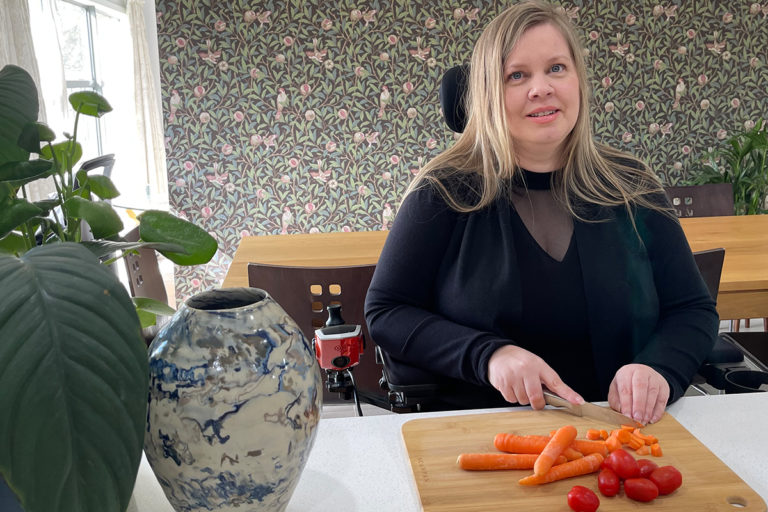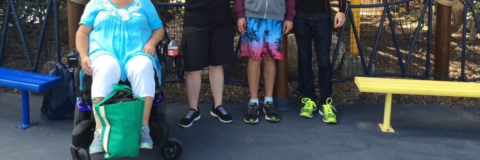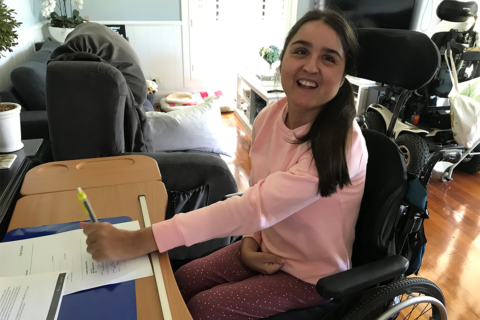
When Melanie was 10 years of age, she was diagnosed with Limb Girdle Muscular Dystrophy – an umbrella term for over 20 different genetic mutations that typically affect the upper arms, hips, thighs, pelvis, and shoulder areas, causing progressive muscle atrophy.
Despite doctor’s predicting she would require a wheelchair once she reached teenage years, her condition progressed at a slower pace, allowing her to enjoy her youth and independence.
“I grew up in a rural area near Dunedin in the South Island of New Zealand. My three siblings and I spent the majority of our free time outdoors, roaming the beach and paddocks, climbing vines, playing in the neighbours’ hay barn and riding their ponies. Although I fatigued quicker and put in more effort than others, my teenage years and young adulthood were quite normal and filled with a flurry of activities.”
In the Barossa Region, SA, Melanie now lives with her husband Kane, enjoying the beautiful countryside and the time they are able to spend together. She has found a love for gardening; learning about the medicinal properties of plants; making natural body creams & balms; and reading. Past times such a knitting and other day-to-day task having become more difficult, however, as Melanie’s condition progresses.
“Over the years I started noticing walking upstairs was becoming increasingly difficult, I would fall over the slightest variant in ground levels, getting myself up off the floor became hard. I have now progressed to the point where everyday tasks such as showering, getting dressed, lifting items, rolling over in bed – activities I never used to think about – have become challenging.”
With her husband Kane working full-time, Melanie is at home for long periods each day. In order to navigate between rooms, she was using an office chair for transport and to access food and drinks, which was becoming far more difficult and unsafe, as her leg and arm muscles weakened.
As a New Zealander who has made her home in Australia, Melanie is ineligible for NDIS funding – a situation that affects many individuals residing in Australia. This is where Youngcare stepped in. Through an At Home Care Grant, funded by our generous donors, we were able to equip Melanie with a powerchair. Because of Youngcare, Melanie is able to feel more confident when home alone.
“I am able to prepare food and drinks safely. Because it has the eye level function, I am able to get light objects off shelves. This function also makes me feel more confident when someone knocks on the door. It allows me to be at the same height of the person at the other end. It’s much better than always looking up at someone.”
It has taken the anxiety away from day-to-day tasks and allows Kane to stress less while he is away from home, as he knows she has a safer way to get around the house. It also allows Melanie to take time for herself, to relax and unwind and enjoy the beautiful location in which she lives.
“Most days I would just be sitting inside. Now, if it’s a nicer sunny day, I’m able to get outside and listen to the birds. Without this chair, I would just sit inside all day and it’s not good for your mental health. Being able to hear the birds and enjoy nature makes such a difference.”
Kane and Melanie are aware of the difficulty others in similar situations face. Accessibility equipment is essential in leading a normal, independent life, however does require large sums of money. Their appreciation for these grants, which support refugees, migrants and New Zealander’s, as well as many Australians, stems from a place of empathy and understanding.
“I don’t think people realize how expensive it is, living like this. You have to make your shower accessible; you have to make your toilet the right height so you can get off it and make the doorways wider. So, without sufficient funding, many people living with disabilities have to pack up and return to their birth-country. This can mean leaving your family and your kids behind. You’ve made the decision to set up a life here, so you should be able to stay.”
Melanie was ever-so gracious in receiving this grant, as it allowed her to stay at home with Kane and continue living her youthful-life. She wanted to express her gratitude to you, our generous supporters and donors:















